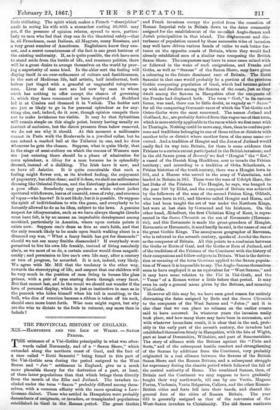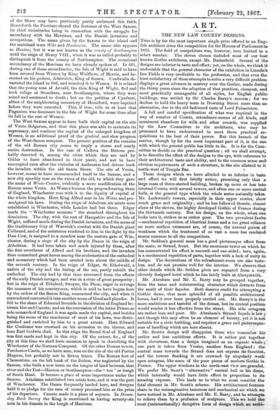PERIOD.
THE existence of -a- Visi-Gothic principality in what was after- -IL wards called Normandy, and- of a "Saxon Shore," which -extended along the northern coast of Gael, and the fact of -a race called 44 Eutti Saxonici " being found in this part of the Vise-Gothic area during the period assigned to the West Saxon and " Jute " settlement in England, give us a much more plausible theory for the derivation of a part, at least, -of these latter populations than that which brings them directly from the mouth of the Elbe and Jutland. The invaders in- eluded under the term " Saxon " probably differed among them- selves, with a common affinity with the races speaking a Low- German dialect. Those who settled in Hampshire were probably descendants of emigrants, or invaders, or transplanted populations established in Gaul in the Roman period. The great Gothic and Frank invasions occupy the period from the cessation of Roman Imperial rule in Britain down to the dates commonly assigned for the establishment of the so-called Anglo-Saxon and Jutish principalities in that island. The displacement and dis- turbance of population caused by these successive tides of invasion may well have driven various bands of exiles to seek better for- tunes on the opposite coasts of Britain, where they would find already established men of a similar race composing the British Saxon Shore. The conquerors may have in souse cases mixed with or followed in the wake of such emigrations, and Franks and Goths, as well as " Saxons " of the Saxon Shore, may have given a colouring to the future dominant race of Britain. The Eutti Saxonici in that case would probably be a portion of the previous Gothic conquering population of Gaul, which had become ,paixed up with and dwellers among the Saxons of the coast, just as they dwelt among the Saxons in Hampshire after the conquests of the Franks had displaced both. The term "Goth," in ita various forms, was used, there can be little doubt, as vaguely as " Saxon" for all the conquering Germanic races of which the Visi-Goths and Otero-Gotha were the most renowned. The names Jutland and Gothland, &c., are probably derived from this vague use of that term, which is more strictly applicable to the races which we first meet with in Thuringia. Nothing could be more easy, then, than to confuse per- sons and traditions belonging to one of these tribes or districts with another tribe or district where another form of the same name oc- curred. And a tradition of Hengist and the Jutes of Jutland would easily find its way into Britain, for there is some evidence that Frisians to a certain extent participated in the British invasions ; and in the old Saxon poem of Beowulf we find "Hengist" the " a vassal of the Danish King Healfdene, sent to invade the Frisian territory ; and according to a tradition of Ocka Schorlensis, Frisian historian of the tenth century, there was a Hengist born in 361, and a Horsus who served in the army of Valentinian, and landed in Britain in 885. These were the sons of Udolph Haro, the last Duke of the Frisians. This Hengist, he says, was hanged in the year 389 by Eldol, and the conquest of Britain was achieved by the followers of the sons of the second Frisian King, Odibalt, who were born in 441, and likewise called Hengist and Horse, and who bad been taught the art of war under the Northern Kings, but were at last slain by Gonnund and his Irishmen. On the other hand, lEthelbert, the first Christian King of Kent, is repre- sented in the Saxon Chronicle as the son of Eormenric (Herman- ric), and this Eormenric is made the great-grandson of Hengist. Eormemic or Hermanric, it need hardly be said, is the name of one of the great Gothic Kings. The anonymous geographer of Ravenna, who is referred to the seventh century, speaks of Ansehis the Saxon as the conqueror of Britain. All this points to a confusion between the Goths or Butts of Gaul, and the Gotha or Bets of Jutland, and of the traditions of the Frisians of the Continent with the history of their companions and fellow-subjects in Britain. What is the deriva- tion or meaning of the term Gewissas applied to the Saxon popula- tion of Wessex it is impossible to say. The Anglo-Saxons themselves seem to have employed it as an equivalent for "West Saxons," and it may have some relation to the Visi in Vim-Cloth, and the " Vesus " of a Roman writer a little before that period. It may even be only a general name given by the Britons, and meaning Visi-Goths.
However all this may be, we have seen good reason for entirely distrusting the dates assigned by Bede and the Saxon Chronicle to the conquests of the West Saxons and " Jutes ;" and it is also clear that we can place no reliance on the earlier events said to have occurred. In whatever years the invasion really took place, and how many there may have been in succession, and with whatever immediate result, it is clear that in the end, prob- ably in the early part of the seventh century, the invaders had established themselves firmly in Hampshire, with the Isle of Wight, part at least of Dorsetallire, Wiltshire, and part of Somersetahire. The story of alliance with the Britons against the "Picts and Scots," and of the subsequent hostile conduct and strengthening of the Saxons by additions from the Continent, very probably originated in a real alliance between the Saxons of the British Saxon Shore and the Roman Britons, and a subsequent struggle for supremacy during the chaotic period which followed the fall of the central authority of Rome. The combined Saxons, then, of Britain and the Continent we may suppose to have gradually fought their way northwards, till one by one Vectis, Magnus Portus, Vindomis, Yenta Belgarnm, Calleva, and the other Boman- British cities and forts fell into their hands, and shared the general fate of the cities of Roman Britain. The year 635 is generally assigned as that of the conversion of the West-Saxon invaders to Christianity. The old Saxon residents of the Shore may have previously partly embraced this faith. Henceforth the Province shared the fortunes of the West Saxons, its chief vicissitudes being in connection with the struggle for ascendancy with the Mercians, and the Danish invasions and occupations. The name given by the Saxons to the island and the mainland were Wiht and Hantescire. The name also appears as .Hantun, but it was not known as the county of Southampton until the reign of Henry VEIL, when it was so called probably to distinguish it from the county of Northampton. The occasional ascendancy of the Mercians we have already spoken of. In 661, during one of these ascendancies, the Isle of Wight is said to have been severed from Wessex by King Wulfhere, of Mercia, and be- stowed on his godson, Adelvalch, King of Sussex. Ceadwalla de- vastated the island in 686, and reunite it to Wessex. It is related that the young sons of Arvald, the then King of Wight, fled and took refuge at Stoneham, near Southampton, where they were seized and sentenced to death ; but on the petition of Cynibert, abbot of the neighbouring monastery of Hrentford, were baptized before they were executed. This, if true, tells us at least that Paganism was dominant in the Isle of Wight for some time after its fall in the rest of Wessex.
The West SaXons appear to have built their capital on the site of Yenta Belgarum, and that this place was able to maintain its supremacy, and continue the capital of the enlarged kingdom of Wessex, is an additional proof of the gradual and slow progress of the West-Saxon conquest. The present position of the remains of the old Roman city seems to imply a storm and nearly entire destruction. In the case of Calleva the Britons pro- bably deserted it, among the cities which they are said by Gildas to have abandoned in their panic, and not to have reoccupied even after the victories of Ambrosias had driven back the invaders within the old Saxon Shore. The site of Yenta, however, seems to have recommended itself to the Saxons, and a new city speedily rose on the ruins of the old, to which they gave the name of Winte-Ceastre, evidently a mere modification ot the Roman name Vesta. As Wessex became the preponderating State of England, Winchester rose with it to the dignity of capital of the whole kingdom. Here King Alfred sent in his IVitan and pro- mulgated his laws. During the reign of Athelstan six mints were established in Winchester, while London had but three. Edgar made the "Winchester measure" the standard throughout his dominions. The city, with the rest of Hampshire and the Isle of Wight, suffered much during the Danish invasions, and the scene of the traditionary Guy of Warwick's combat with the Danish giant Colbrand, and of the assistance rendered to him in the fight by the Dun Cow, is assigned to a meadow near the eastern gate of Win- chester, during a siege of the city by the Danes in the reign of Athelstan. It had been taken and much injured by them, after the first overthrow of Alfred and his brothers, and the invaders then committed great havoc among the ecclesiastics of the cathedral and monastery which had been erected here about the middle of the seventh century. In the reign of Edgar, St. Ethelwald, a native of the city and the bishop of the see, partly rebuilt the cathedral. The city had by that time recovered from the effects of the early Danish ravages, and was in a state of great prosperity ; but in the reign of Ethelred, Sweyne, the Dane, eager to revenge the massacre of his countrymen, which is said to have begun here by the orders of the Saxon King, summoned the city, and when it surrendered converted it into another scene of blood and plunder. It fell to the share of Edmund Ironside in the division of England be- tween him and Canute, and on the succession of the latter Prince as sole monarch of England it was again made the capital, and besides being the scene of the enactment of most of his laws, was distin- guished and enriched by him to a great extent. Here Edward the Confessor was crowned on his accession to the throne, and here Earl Godwin died. In this reign the Broad Seal of England was first made and kept in this city. Of the extent, &c., of the city at this time we shall have occasion to speak in describing the Winchester of the Norman Conquest. Of the other Roman towns, Porcheeter Castle, as we have seen, rose on the site of the old Portus Magnus, but probably not in Saxon times. The Roman fort of Clausentum, on the left bank of the Itchen, was neglected by the Saxons, who built a new town on the tongue of land between that
. river and the Test—Hanton or Southampton—the" ton" or burgh of South Rant. It became a place of some importance under the Saxons. Atheist= established two mints here, and it was the port of Winchester. The Danes frequently landed here, and Sweyne held it as pledge for the sum of money promised him as the price of his departure. Canute made it a place of sojourn. In Domes- day Book Survey the King is mentioned as having seventy-six men in his domain in the burgh of Ilantune.































 Previous page
Previous page